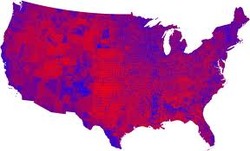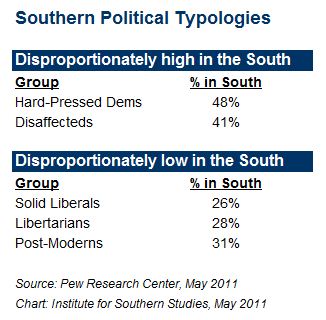Are Southerners liberal? Conservative? Both?
 Liberal or conservative. Left or right. Red state or blue state. In the world of pundits and elections, the public's political views often get divided and lumped into two -- and only two -- camps.
Liberal or conservative. Left or right. Red state or blue state. In the world of pundits and elections, the public's political views often get divided and lumped into two -- and only two -- camps. But as we know, most people don't see the world that way. That doesn't necessarily make them "moderate," a vague and largely useless categorization; often, people hold passionate views about unions or abortion, but have conflicted opinions about other issues. So that leaves open the question: What do we call such people?
For years, the Pew Research Center has been mapping the complicated terrain of political typology in the U.S. Last week, they came out with their latest analysis -- "Beyond Red vs. Blue" -- and, as usual, they came up with findings that were at once both fascinating and common sense.
The upshot: According to their national surveys, there are at least nine different political "types" in the U.S. And most importantly, none of them account for more than 14 percent of the public -- which means, that, in our winner-take-all elections, Democrats and Republicans are constantly trying to win over a majority of these diverse and shifting constituencies.
Pew's findings are especially interesting for the South. It's often assumed that Southern states -- especially Southern white voters -- are inherently conservative, and the region is only dipping into blue state territory thanks to transplants and immigrants.
There's an element of truth to that, but Pew's surveys have consistently shown that the Southern electorate is much more conflicted and complicated than many realize.
For example, Pew's survey identifies two groups that are disproportionately large in the South: "Hard-Pressed Dems" and "Disaffecteds." While Southerners made up 37 percent of Pew's survey respondents, those two groups were over-represented in Southern states, as you can see in this chart:

So what are "Hard-Pressed Dems?" According to Pew:
This largely blue-collar Democratic group is struggling financially and is generally cynical about government. Nearly half (47%) expect that they will not earn enough to lead the kind of life they want. Socially conservative and very religious.One of the most striking findings: Only 16 percent of this group agree with the statement that "most corporations make a fair and reasonable profit" -- a view that would seem to make them amenable to consumer and labor reform if those don't get trumped by the "socially conservative" issues on Election Day.
Critical of both business and government. View immigrants as an economic burden and a cultural threat. Supportive of environmental protection in general but concerned about the economic impact of environmental laws and regulations.
What seems to distinguish "Hard-Pressed Dems" from "Disaffecteds" -- the other group disproportionately strong in the South -- is the latter's pessimism. According to Pew:
Disaffecteds are very critical of both business and government. They are sympathetic to the poor and supportive of social welfare programs. Most are skeptical about immigrants and doubtful that the U.S. can solve its current problems. They are pessimistic about their own financial future.In other words, they're similar in outlook to the "Hard-Pressed Dems," but less hopeful, less engaged -- and less partisan (they largely identify as Independents).
A majority believe that the government is wasteful and inefficient and that regulation does more harm than good. But nearly all say too much power is concentrated in a few companies. Religious and socially conservative.
But there's another key difference: While "Hard-Pressed Dems" are disproportionately female and African-American, "Disaffecteds" are largely white. While sharing many views and frustrations, the economically struggling white voters are less likely to see Democrats -- or any political party -- as the answer.
My guess is that this points to the conflicted views Southern whites hold about government. But, as with everything else, that issue isn't cut-and-dry, either: Notice that Southerners actually rank low on the "libertarian" category, the group with the most animosity to government involvement in public life.
The upshot: Despite what the Tea Party or libertarian think tanks might say, many Southerners still see a role for government in resolving the problems they and their communities face.
What's your political typology? Take the Pew Research Center quiz here.
Tags
Chris Kromm
Chris Kromm is executive director of the Institute for Southern Studies and publisher of the Institute's online magazine, Facing South.
